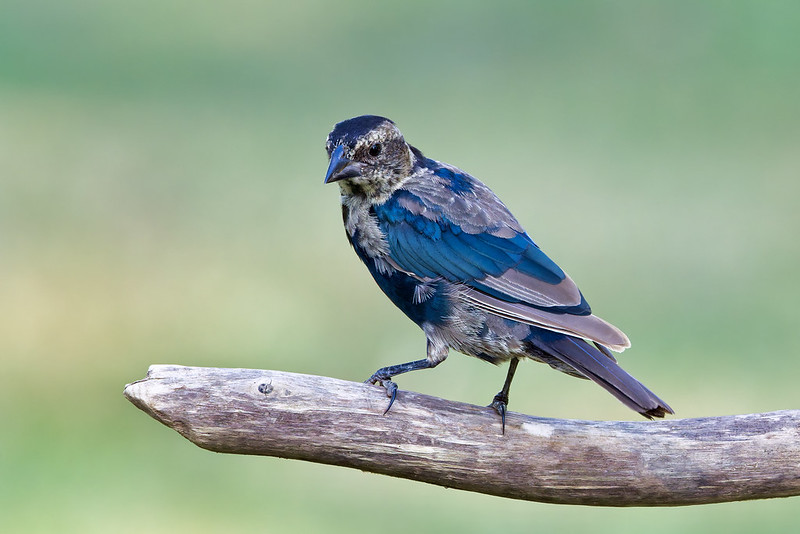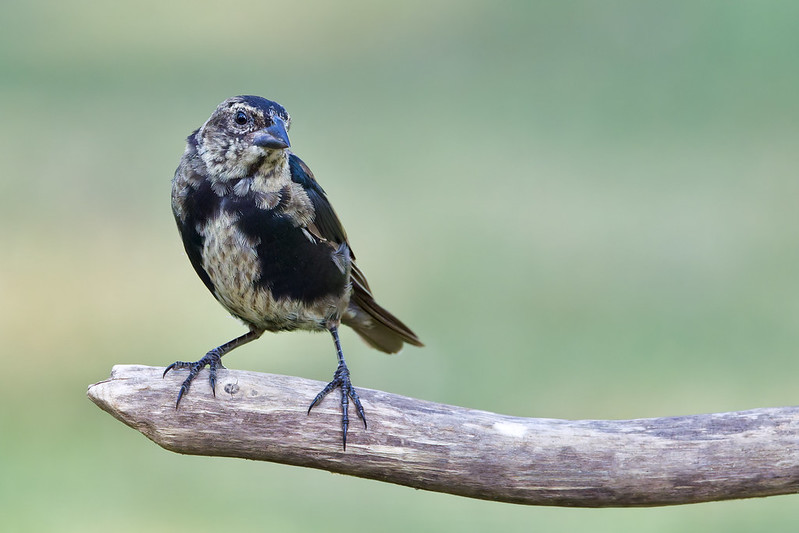Juvenile Brown-headed Cowbirds often go unnoticed, blending into the background with their streaked brown feathers. However, when they begin their molt into adulthood, their plumage transforms into a patchwork of mottled browns, blacks, and flashes of iridescent blue.
Recently, I had the chance to photograph a young cowbird in this exact stage. Perched on a branch, it paused just long enough to catch the light, revealing the remarkable mix of shades in its feathers. For me, it was the first time witnessing a Brown-headed Cowbird halfway between youth and adulthood.

What Happens During Molting in Brown-headed Cowbirds
As juveniles, cowbirds are typically brown and streaked, giving them a fairly plain appearance. During their molt, young males start replacing their feathers with glossy black ones, which can shimmer blue or purple in the sunlight. The contrast between the two stages creates an uneven, patchy look that lasts only briefly before the full adult plumage takes over.
This transitional stage not only helps birders identify the age of a cowbird but also offers a fascinating glimpse into nature’s process of renewal.
Why Molting Stages Are Special to Photograph
Photographing a bird in molt can feel like catching a fleeting moment of transformation. These stages highlight a vulnerability in birds, yet they also reveal the beauty of change. With the Brown-headed Cowbird, the patchwork of feathers shows both where the bird has been and where it’s heading.

Spotting Juvenile and Molting Cowbirds
If you are out birding and want to spot molting cowbirds, look for:
- Streaked brown feathers with uneven dark patches
- Subtle iridescent blue or purple tones, especially in sunlight
- A mix of juvenile and adult feather textures
These traits can help distinguish them from both plain juveniles and fully molted adults.
Photographer’s Note
This moment was captured with a Canon EOS R5 Mark II paired with the RF 100–500mm F4.5–7.1 L IS USM.
Settings:
- Aperture: ƒ/8.0
- Exposure Compensation: +2/3
- Shutter Speed: 1/800
- ISO: 4000
The higher ISO helped balance light against the shaded perch, while still keeping enough detail to show the mix of brown and iridescent feathers.
Tip: When photographing birds in transitional plumage, use exposure compensation to avoid losing detail in the darker feathers. A small adjustment can make the iridescence pop without overexposing the lighter browns.
How did you ever figure out? It was a juvenile cowbird?Fascinating!
I’m just a photographer and not a “Birder” so I have to ask someone that knows birds. My go to person is Mia (https://www.onthewingphotography.com/wings/) for everything about birds.